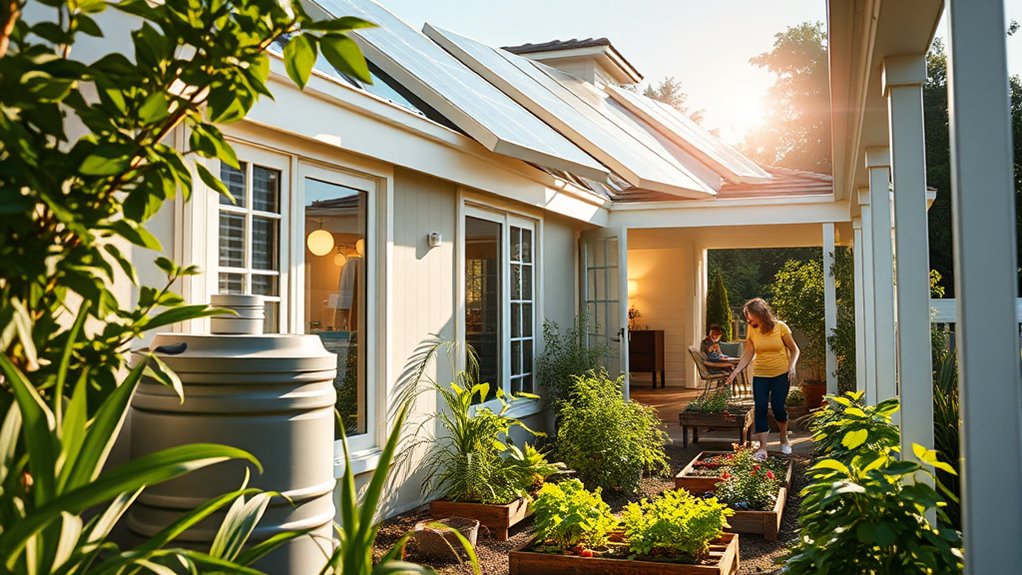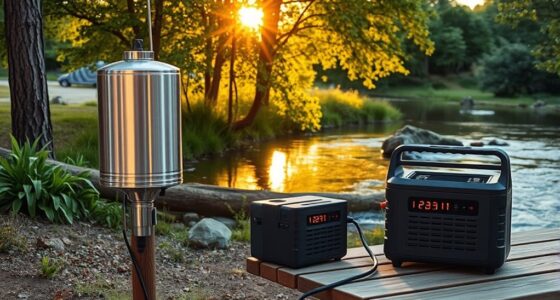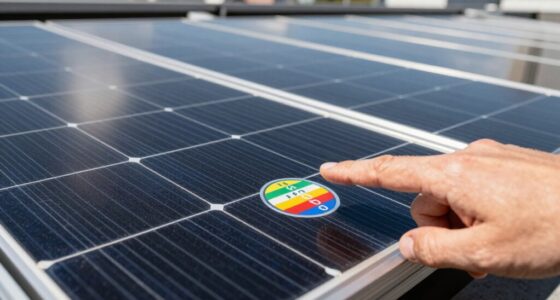Upgrading your home with solar panels and smart thermostats can save you money and benefit the environment. Solar panels harness sunlight to generate electricity, reducing your reliance on the grid and lowering energy bills—plus, incentives can help cover installation costs. Smart thermostats optimize your heating and cooling, cutting energy waste and providing remote control. Together, these upgrades boost your home’s value, reduce emissions, and increase efficiency. Keep exploring to discover even more eco-friendly improvements for your home.
Key Takeaways
- Installing solar panels reduces electricity bills and can generate income through energy sales.
- Upgrading to smart thermostats optimizes HVAC use, lowering energy costs and environmental impact.
- Combining solar panels with smart thermostats enhances home efficiency and long-term savings.
- Solar incentives and rebates decrease installation costs, increasing affordability of eco-friendly upgrades.
- These upgrades boost home value, resilience, and contribute to a sustainable, cost-effective lifestyle.

Making eco-friendly upgrades to your home is one of the most effective ways to reduce your environmental impact and save money in the long run. One of the best investments you can make is installing solar panels. They harness sunlight to produce electricity, cutting down your reliance on the grid and lowering your energy bills. Although the upfront cost might seem significant, the energy savings over time quickly offset that expense. Plus, many regions offer tax incentives and rebates that make solar panels even more affordable. Once installed, they require minimal maintenance, and any excess energy you generate can often be sold back to the utility company, providing an additional financial benefit. Solar panels also boost your home’s value, making it more attractive to future buyers interested in sustainable living.
Alongside solar energy, upgrading your home’s heating and cooling system with smart thermostats can drastically reduce your energy consumption. These devices learn your schedule and temperature preferences, adjusting your HVAC system accordingly to optimize efficiency. For example, you can set the thermostat to lower the temperature when you’re away or asleep, then have it ready at just the right time when you wake up or return home. This automation prevents unnecessary energy use, which not only saves you money but also reduces your carbon footprint. Many smart thermostats can be controlled remotely via smartphone apps, giving you the convenience of managing your home’s climate from anywhere, even when you’re not there. Some models even provide detailed energy usage reports, helping you identify further savings opportunities.
Both solar panels and smart thermostats are straightforward upgrades that can quickly pay for themselves through energy savings. They also contribute to a more sustainable lifestyle by reducing your reliance on fossil fuels and lowering greenhouse gas emissions. These upgrades are particularly attractive because they integrate seamlessly into modern homes and can be scaled based on your budget and needs. For instance, you might start with a basic smart thermostat and expand to solar panels once you’re ready for a bigger investment. Implementing these eco-friendly solutions not only benefits the planet but also gives you greater control over your energy costs and home comfort. Additionally, exploring renewable energy sources like solar can further enhance your home’s sustainability profile. Over time, you’ll notice the financial and environmental benefits stacking up, making your home more sustainable and resilient for years to come.
Frequently Asked Questions
Are Eco-Friendly Upgrades Suitable for Old Homes?
You might wonder if eco-friendly upgrades suit old homes. The good news is, they often do! You can improve vintage insulation to boost energy efficiency without damaging character. Replacing historic windows with eco-friendly ones can save money and maintain charm. These upgrades are designed to fit older structures, making your home more sustainable while preserving its unique appeal. So, yes, eco-friendly changes can work well for vintage homes.
What Is the Typical Payback Period for Solar Panels?
Think of solar panels like planting a tree—you’ll enjoy its shade later. Usually, your payback period ranges from 6 to 10 years. Solar panel efficiency and installation costs influence this, with more efficient panels saving you money faster. I installed panels five years ago, and now my energy bills are nearly zero. Overall, investing in solar is a smart move, with benefits that grow over time.
Do Eco-Friendly Upgrades Increase Property Value?
You’ll find that eco-friendly upgrades like energy-efficient lighting and sustainable building materials can boost your property value. Buyers increasingly prioritize green homes, so these upgrades make your property more appealing. Not only do they enhance aesthetics and functionality, but they also demonstrate your commitment to sustainability. Overall, investing in eco-friendly features can result in higher resale value, making them a smart choice for long-term financial benefits.
Are There Government Incentives for Green Home Improvements?
Did you know that over 80% of homeowners are interested in green home improvements? You can benefit from government rebates and tax incentives that make eco-friendly upgrades more affordable. These programs often cover solar panels, energy-efficient windows, and insulation. By taking advantage of government incentives, you not only reduce your environmental impact but also save money long-term. Check local programs to see which rebates are available for your eco-friendly home upgrades.
How Do Eco-Friendly Upgrades Impact Home Insurance Costs?
Eco-friendly upgrades can positively impact your home insurance costs by qualifying you for insurance discounts. Many insurers view eco-friendly features, like solar panels or upgraded insulation, as reducing risk and damage potential. These upgrades may also influence coverage considerations, potentially lowering premiums or expanding your coverage options. By investing in green improvements, you not only save energy but can also benefit financially through reduced insurance expenses.
Conclusion
By making eco-friendly upgrades, you not only help the environment but also save money in the long run. Imagine installing solar panels and seeing your energy bills drop considerably—just like Sarah, who cut her costs by 30% in a year. Every small change, from energy-efficient windows to smart thermostats, adds up. Start today, and you’ll enjoy a more sustainable home while keeping more money in your pocket for years to come.










